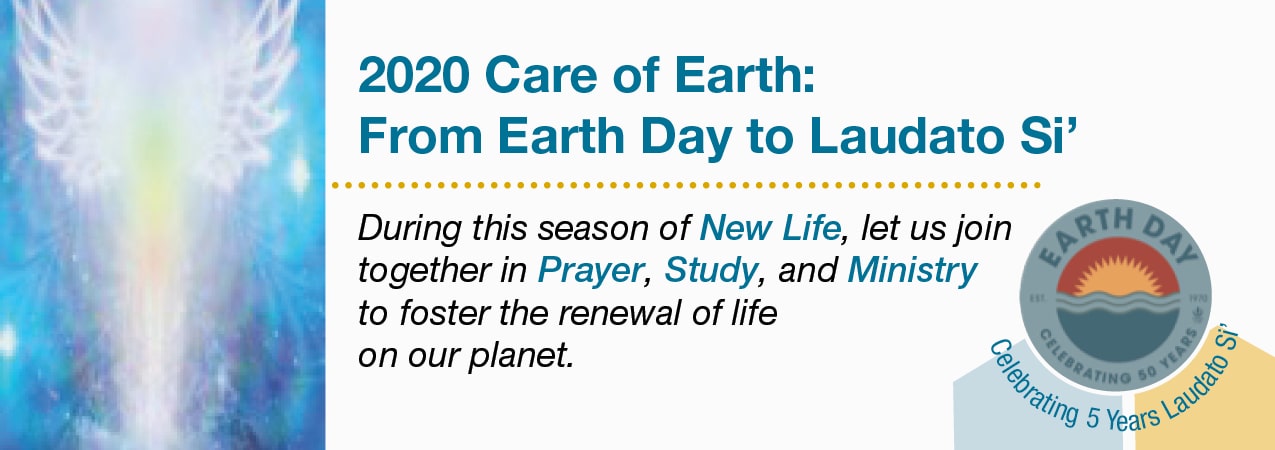
 2020 is the fifth anniversary of Laudato Si’.
2020 is the fifth anniversary of Laudato Si’.
The theme for Earth Day 2020 is climate action. The enormous challenge — but also the vast opportunities — of action on climate change have distinguished the issue as the most pressing topic for the 50th anniversary.
Climate change represents the biggest challenge to the future of humanity and the life-support systems that make our world habitable. https://www.earthday.org/earth-day-2020/
We’ve come a long way toward protecting our common home, but the journey ahead demands radical commitment to our Creator and each other. We’re coming together for the next steps in our groundbreaking journey of hope. Building on the recent Synod on the Amazon, the Earth Day climate strikes, and thousands of concrete actions taken by Catholic communities everywhere, this May we’re increasing our ambition for creation. The urgency of the crisis means that we can’t rest on our laurels. https://laudatosiweek.org/
Join Pope Francis and take the next step in your Laudato Si’ journey. Commit to an action that grows your response to “the cry of the earth and the cry of the poor.” Catholic communities everywhere will celebrate the fifth anniversary of Laudato Si’ during the week of May 16-24. Our faith calls us to do more together.
Pope Francis states, “I urgently appeal, then, for a new dialogue about how we are shaping the future of our planet. We need a conversation which includes everyone, since the environmental challenge we are undergoing, and its human roots, concern and affect us all. … As the Bishops of Southern Africa have stated: “Everyone’s talents and involvement are needed to redress the damage caused by human abuse of God’s creation”. . . All of us can cooperate as instruments of God for the care of creation, each according to his or her own culture, experience, involvement and talents.”
HOW CAN WE RESPOND as we celebrate the Easter season of new life in ways new and original in our lives? Each week we will share handouts on EcoJustice issues including commentary from Laudato Si’.
Week of April 27 – CLEAN AIR: The violence present in our hearts, wounded by sin, is also reflected in the symptoms of sickness evident in the soil, in the water, in the air and in all forms of life. This is why the earth herself, burdened and laid waste, is among the most abandoned and maltreated of our poor; she “groans in travail” (Rom 8:22). We have forgotten that we ourselves are dust of the earth (cf. Gen 2:7); our very bodies are made up of her elements, we breathe her air and we receive life and refreshment from her waters. Laudato Si’ 2
Week of May 4 – CLEAN WATER: Fresh drinking water is an issue of primary importance, since it is indispensable for human life and for supporting terrestrial and aquatic ecosystems. Sources of fresh water are necessary for health care, agriculture and industry. Water supplies used to be relatively constant, but now in many places demand exceeds the sustainable supply, with serious consequences in the short and long term. Large cities dependent on significant supplies of water have experienced periods of shortage, and at critical moments these have not always been administered with sufficient oversight and impartiality. Water poverty especially affects Africa where large sectors of the population have no access to safe drinking water or experience droughts which impede agricultural production. Some countries have areas rich in water while others endure serious scarcity. Laudato Si’ 28
Week of May 11 – DEFORESTATION: the scientific community warns of the risks of deforestation, which to date comprises almost 17% of the whole Amazon forest. This threatens the survival of the entire ecosystem, endangering biodiversity and changing the cycle of water that is vital for the survival of the tropical forest. In addition, the Amazon plays a critical role as a buffer against climate change and provides invaluable and fundamental life support systems related to air, water, soils, forests and biomass. At the same time, experts remind us that by using advanced science and technologies for an innovative bio-economy of standing forests and flowing rivers, it is possible to help save the rainforest, protect the ecosystems of the Amazon and its indigenous and traditional peoples and, at the same time, provide sustainable economic activities. Final Document of the Amazon Synod 11
Week of May 18 – CLIMATE, MIGRATION, HUMAN TRAFFICKING: The phenomenon of migration must be addressed. There are three simultaneous migratory flows in the Amazon Region. First, the traditional mobility of indigenous groups in their territories, which are now separated by national and international borders. Secondly, the forced displacement of indigenous peoples, peasants and river dwellers from their territories, whose final destination tends to be the poorest and worst areas of the cities. Thirdly, forced inter-regional migration and the phenomenon of refugees forced to leave their countries (Venezuela, Haiti, Cuba, among others) who need to cross the Amazon as a migratory corridor. Final Document of the Amazon Synod 12
Week of May 25 – Laudato Si’ Week
A sense of deep communion with the rest of nature cannot be real if our hearts lack tenderness, compassion and concern for our fellow human beings. It is clearly inconsistent to combat trafficking in endangered species while remaining completely indifferent to human trafficking, unconcerned about the poor, or undertaking to destroy another human being deemed unwanted. This compromises the very meaning of our struggle for the sake of the environment. Laudato Si’ 91

